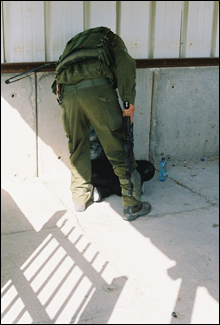
|
Each summer, the Maine College of Art’s MFA program brings eight renowned “cultural practitioners” — artists, musicians, poets, curators, critics, philosophers — to serve as visiting faculty for its two month blur of life and art. The program’s faculty calls this rigorous blend of pedagogical and social experiment the “Summer Intensive.” Each day, the work continues into the night and evolves into talks that last until morning — when the work begins. Sleep seems to come in September.
As part of the program, visiting faculty deliver free public lectures for eight consecutive Monday evenings through August. For its sixth week, the program will host painter, psychoanalyst, and philosopher Bracha L. Ettinger, who will give a public talk on July 30.
Based in Paris, Ettinger has taught at the University of Leeds and the Bezalel Academy of Art in Jerusalem. She is an accomplished and widely-exhibited painter, and the author of several books and dozens of articles exploring her notion of the “matrixial borderspace” — a space of emergence, “a shareable, psychic dimension that underlies the individual unconscious and experience.”
Ettinger has referred to herself as a painter first, a clinical psychologist second. Her writing and her thought are calibrated by the experience and practice of painting. Her writing is reminiscent of a kind of painterly prose. For her, it seems, painting is a sophisticated language with which to think through, literally to work through, the modes of experience.
I asked MFA program director Katarina Weslien what it was that, in her view, Ettinger’s work would contribute to the work of this year’s intensive?
“With Bracha arriving in the sixth week of the eight-week intensive,” she says, “I am imagining that the clarity in her articulation of ‘subjectivity-as-becoming’ will be an important addition and ingredient, as well as her ideas about the area of the psychic history of the individual subject and our collective history of the group. Her insistence that this space is not clearly demarcated will be an important topic of conversation. So will her ability to push us to consider our relationship to a larger history, so much larger and unmanageable that the single artist . . . is obligated to question the role of artist as citizen in today’s world. What does the notion of a ‘self’ mean as artists attempt to understand this present moment?”
In a recent posting entitled “Compassion and Com-passion,” a short but intense and powerful consideration of the theoretical and indeed existential value of the notion of compassion, Ettinger wrote: “Compassion is a term that politicians can (and do) abuse in the same way that they can abuse whatever serves their purpose. I can’t stop any politician from using this term, but this is not going to stop me from practicing and articulating compassion. Compassion is intrapsychic, subjective and trans-subjective. It works its way, like art does, by fine attunements that evade the political systems.”
What extraordinary promise and power there is in this conception of ways of working that operate by means of “fine attunements” that elide and escape systematized politics, in this hope against hope built upon these meta-political practices of a variety of peace that takes shape as enactments of openness and compassion.